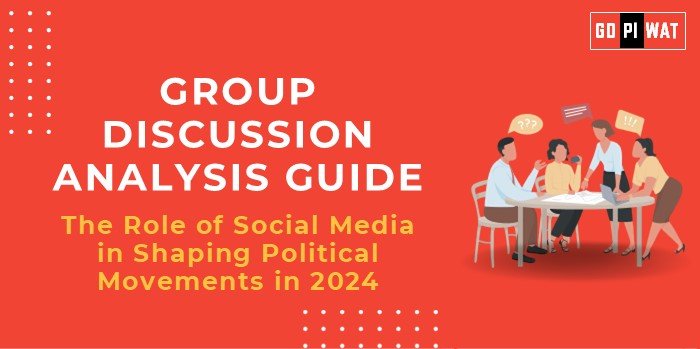📋 Group Discussion (GD) Analysis Guide: The Role of Social Media in Shaping Political Movements in 2024
🌐 Introduction to The Role of Social Media in Shaping Political Movements in 2024
• Opening Context: “In 2024, social media continues to redefine political landscapes worldwide, amplifying voices, influencing elections, and mobilizing communities faster than ever before.”
• Topic Background: Since the Arab Spring to recent movements like #BlackLivesMatter and farmer protests, social media has proven instrumental in mobilizing people. Its influence has only grown, impacting political discourse, electoral outcomes, and civil society initiatives.
📊 Quick Facts and Key Statistics
• Youth Political Engagement: Approximately 70% of young voters access political information primarily via social media, underscoring its role in shaping perspectives.
• Major Platforms: Facebook, X (formerly Twitter), Instagram, and TikTok lead in political discussions and activism.
• Algorithmic Impact: Studies indicate that content algorithms can influence political opinions and voter behavior.
• Misinformation Spread: Nearly 60% of adults believe social media misinformation impacts elections.
🧑🤝🧑 Stakeholders and Their Roles
- 🛡️ Governments: Legislate regulations, monitor content, and address misinformation.
- 📱 Social Media Companies: Moderate content, manage data privacy, and ensure transparency.
- 🏛️ Political Parties: Leverage platforms for outreach, campaigns, and digital movements.
- 🌐 Citizens: Participate in digital activism, spread political narratives, and fact-check content.
- 📰 Media Organizations: Utilize platforms to amplify coverage, fact-check stories, and shape narratives.
🏆 Achievements and Challenges
✨ Achievements:
- 🚀 Political Mobilization: Social media enabled large-scale movements, such as climate change marches.
- 📢 Awareness Building: Amplified lesser-known issues into mainstream politics.
- 📈 Increased Political Participation: Studies show an uptick in voter registration due to online campaigns.
⚠️ Challenges:
- 📉 Misinformation and Echo Chambers: Rapid dissemination of false information and algorithmically driven polarization.
- 🔒 Data Privacy Concerns: Incidents like the Cambridge Analytica scandal exposed risks in political targeting.
- ⚖️ Censorship: Platforms face criticism over content moderation biases.
🌍 Global Comparisons:
- 🇺🇸 United States: The 2020 presidential election demonstrated micro-targeting’s influence.
- 🇮🇳 India: Social media played a critical role in national elections and regional movements.
📚 Case Studies:
- 🧵 Hong Kong Protests: Demonstrated the power of encrypted messaging for political mobilization.
- 🌍 #MeToo Movement: Spread globally, challenging powerful figures and systemic injustices.
🗣️ Structured Arguments for Discussion
• Supporting Stance: “Social media empowers marginalized voices and amplifies political movements that may otherwise be ignored by traditional media.”
• Opposing Stance: “The prevalence of misinformation and echo chambers risks polarizing societies and undermining democratic processes.”
• Balanced Perspective: “While social media can democratize discourse and mobilize action, unchecked misinformation and manipulation pose serious risks.”
📈 Effective Discussion Approaches
Opening Approaches:
- 📊 Statistical Impact: “With over 4.8 billion social media users globally, these platforms shape political debates at an unprecedented scale…”
- 📖 Case Study Opening: “Consider the Hong Kong protests—social media enabled real-time organization against state intervention.”
- ⚖️ Contrast: “While social media empowers grassroots movements, it also magnifies hate speech and misinformation.”
🎭 Counter-Argument Handling:
Example: “While censorship is criticized, content moderation remains critical to prevent hate speech.”
🧠 Strategic Analysis of Strengths and Weaknesses (SWOT)
- Strengths: Rapid information dissemination, global reach, youth engagement.
- Weaknesses: Misinformation spread, potential for manipulation, privacy issues.
- Opportunities: Fostering political engagement, promoting transparency, combating misinformation.
- Threats: Regulation challenges, state-level misuse, platform bias.
🎓 Connecting with B-School Applications
• Real-World Applications: Social media analysis for marketing campaigns, digital public relations strategies.
• Sample Interview Questions:
- 🌐 “How does social media impact political stability in emerging democracies?”
- 🗳️ “What role does misinformation play in electoral outcomes?”
• Insights for B-School Students: Consider social media analytics for market research, crisis communication, and ethical governance.


